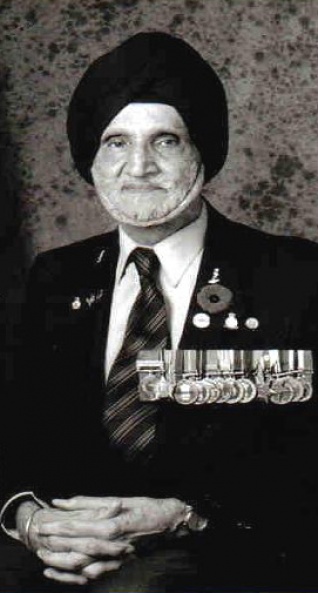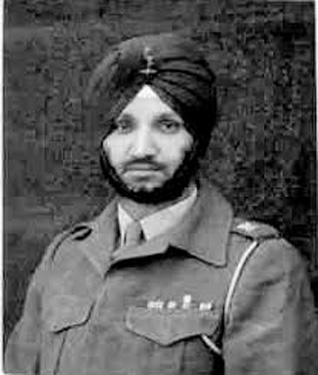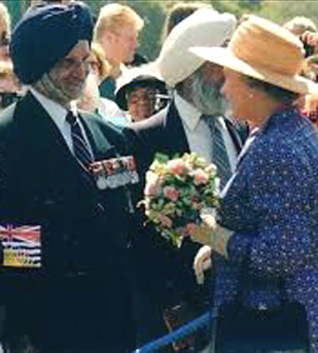Our Heroes
Second World War Hero Went On To Win Human Rights Battle In Canada:
Lt Col Pritam Singh Jauhal
TU THANH HA
Pritam Singh Jauhal, a Second World War veteran who later fought for and won the right of Sikh men to wear turbans in the Royal Canadian Legion’s halls, has died.
He was about 95 (the exact day of his birth, in rural Punjab, was not recorded at the time).
His daughter, Varinder Kaur Bains, confirmed he died Sunday in Surrey, British Columbia, Canada.
Pritam Singh spent 38 years in the Indian Army and Central Reserve Police Force, retiring with the rank of lieutenant-colonel before immigrating to Canada to be with his children in 1980.
He made headlines in 1993 after he challenged a branch of the Royal Canadian Legion in Surrey that wouldn’t let him inside because of his headgear.
He said that as a Sikh he could not remove his turban.
“We fought together. And here we are … you go in the room, I stay outside. Is that the treatment I should be given as a veteran?” he said to The Globe and Mail at the time.
“He became part of that dialogue on what it means to be a Canadian,” said Sharanjit Kaur Sandhra, coordinator of the Centre for Indo-Canadian Studies at the University of the Fraser Valley.
The controversy came at a time when the right of Sikhs to wear their turbans and kirpans was heatedly debated in Canada. Just three years earlier, the RCMP had first allowed a Sikh officer to wear a turban rather than the traditional stetson.
Sharanjit Kaur, who co-authored Pritam Singh’s 2013 memoir, “A Soldier Remembers“, said he was a proud man who insisted that he wouldn’t have launched his campaign but for the fact that he had been invited to the Legion and then turned away.
The foreword of the book was penned by a Canadian reserve army officer who is now Canada’s Defence Minister, Harjit Singh Sajjan.
“[Pritam Singh] could have just gone home and tried to forget the insult, but instead he readied himself for another battle; a battle that he fought with his wits by attacking the ignorance with education,” Harjit Singh wrote.
Pritam Singh was the eldest of the four children of Ram Singh and Hukam Dev Kaur, farmers in the Jalandhar district of Punjab.
Their native village, Johal, only had mud-walled houses, with no paved roads, running water or electricity.
The family didn’t know his birthdate and when he started school, they told an official that young Pritam was five and a half years old. The official then decided that Pritam’s birthday would be Oct. 4, 1920.
The nearest school was a two-mile walk away, and in the evening, Pritam did his homework by the light of a kerosene lantern. He was only the third person from his village to obtain a high school education.
He grew up hoping to emulate his father and uncle, who both had served in the British-Indian army.
During the First World War, his father’s battalion was deployed to what is today Iraq to fight the Ottoman troops in the Mesopotamian campaign.
Pritam’s mother objected to his military ambitions, and when he was about 17, he was sent to live with a relative in Delhi, in the hope that he would find an office job.
After a year, however, he was still unemployed, and in June 1938 he enlisted, joining the Signal Corps. A year later, the Second World War began.
He was trained as a radio operator and in August, 1940, was shipped to East Africa with the 5th Infantry Division. They fought the Italians in Eritrea and Abyssinia, where Pritam had his first experience being shelled by enemy artillery.
The following year, his brigade was deployed to Libya and became part of the British 8th Army. As a wireless operator who rode to the front in a Bren armoured vehicle, Pritam took part in the First Battle of El Alamein in July, 1942, which stopped the German offensive in Egypt.
“The Allied Forces ... faced successive enemy air raids, intensive rockets, tank, artillery and small arms fires and survived. Survived when our ammunition supplies did not reach us on time. Survived when our rations and water were cut in half and halved again. Survived when faced with the extreme heat and dust of the western desert,” he recalled in a letter to the Vancouver Sun on Remembrance Day 2003.
Later that fall, his division was redeployed to fight the Japanese in Burma and Pritam, who had contracted malaria, was repatriated to India to train new soldiers.
By the end of the war, he had the rank of second lieutenant. He remained in the army and was involved in his country’s conflicts against Pakistan, in the Indo-Pakistani War of 1947-48, and the 1965 war in West Punjab.
He retired with the rank of lieutenant-colonel in 1976 and lived in retirement in Punjab’s capital, Chandigarh, when his three children, who had immigrated to Canada, convinced him and his wife, Harjit Kaur, to join them.
He settled in Surrey in 1980. His memoir said he experienced many racist incidents - drivers yelling “Hey Paki! Go back to your country” - and schoolboys throwing an apple at him.
In the fall of 1993, Pritam Singh saw an article in a local paper saying that the Newton branch of the Legion in Surrey was inviting veterans to take part in its Remembrance Day commemoration.
With four other Sikh veterans wearing turbans, he attended the cenotaph ceremony then joined the parade that marched to the Legion hall.
The five Sikhs were about to enter the Legion’s lounge when attendants at the doors stopped them and asked them to remove their turbans.
“My fellow Sikh veterans and I stood outside feeling utterly humiliated,” he recalled in his memoir.
They appealed immediately to the branch president, Frank Underwood, who said there would be no exceptions, then went back inside, leaving the Sikhs at the door.
Pritam Singh said he was further irked because female members were allowed inside while wearing their berets.
He wrote an open letter listing turban wearers who had won the British Empire’s highest military decoration. “Good enough for the Victoria Cross. Not good enough to earn a seat among the heroes of the Newton Legion,” it said.
He contacted politicians and even sent a letter to the Queen.
His campaign triggered abusive phone calls and mail.
Ultimately, but only after pressure from outrage expressed by Canadians from across the country, the national headquarters of the Royal Canadian Legion issued a formal apology and condemned the actions of the local officials.
Admissions policies were still left up to the individual branches. Nevertheless, most Legion branches now allow turban wearers. A spokesman for the Legion’s Dominion Command said there had been no subsequent complaints.
Pritam Singh was eventually invited by other Legion branches and the one that had barred him, ironically, closed four years later because of financial problems.
He was pleased to be invited to meet Queen Elizabeth for tea in 1994, while she was on an official visit in Victoria, B.C. He said she told him he did “a wise thing” in raising the matter with her.
“What a change a few years can make,” he said in his memoirs.
Pritam Singh leaves his son, Sukhdev Singh, and daughter, Varinder Kaur. He was predeceased by his wife, Harjit Kaur, and a daughter, Balwinder Kaur.
[Courtesy: The Globe and Mail. Edited for sikhchic.com]
June 29, 2016
Conversation about this article
1: Pardeep Singh Nagra (Toronto, Ontario, Canada), June 29, 2016, 1:23 PM.
Thank you for your service and your battle with the Legion. It has made our country, Canada, better.
2: GJ Singh (Scottsdale, Arizona, USA), June 30, 2016, 2:35 AM.
An old soldier never dies, always lives on in our hearts and minds. Kudos, Lt Col Pritam Singh ji, for always being a fighter.
3: Heera (Amritsar, Punjab), July 15, 2016, 12:10 PM.
A good man indeed.





